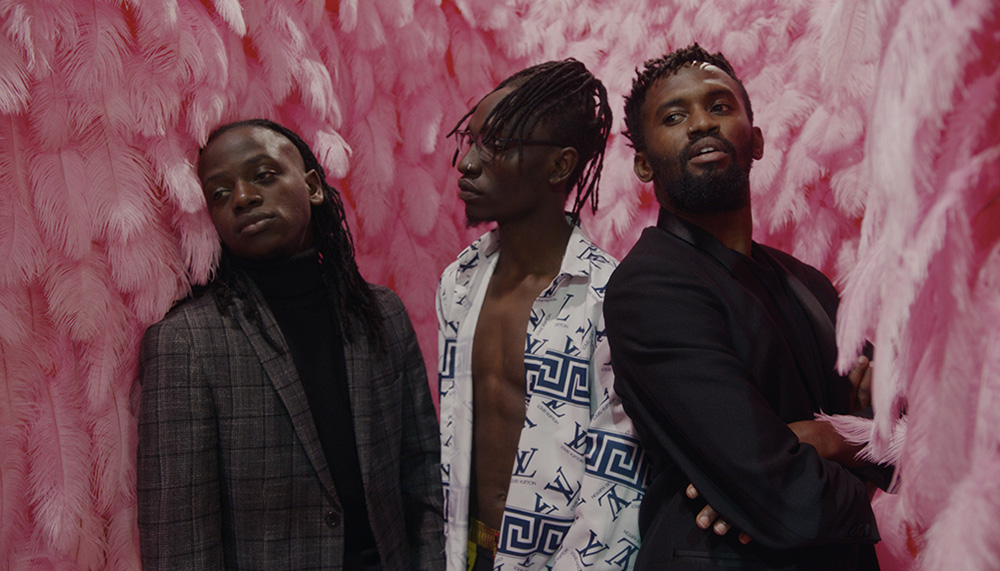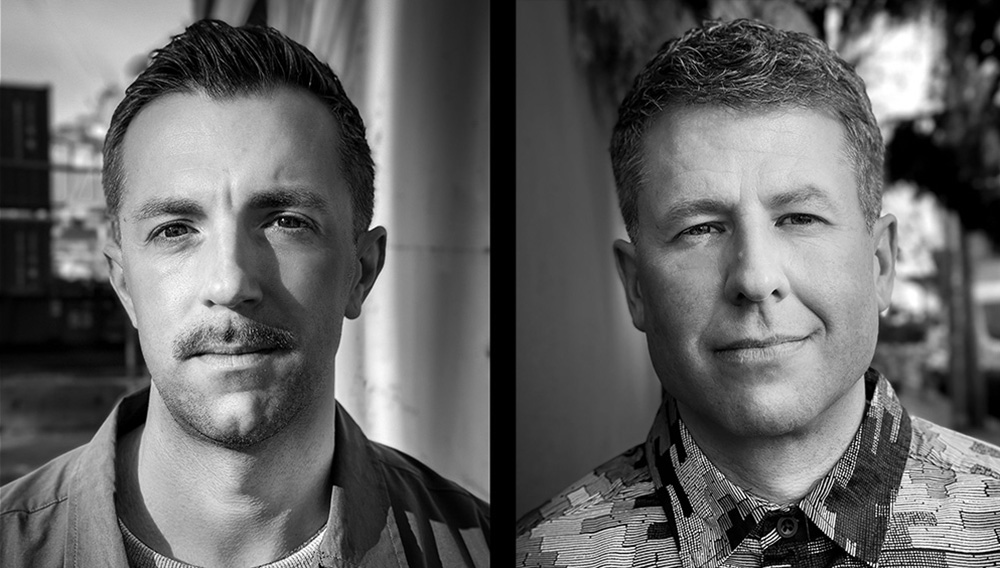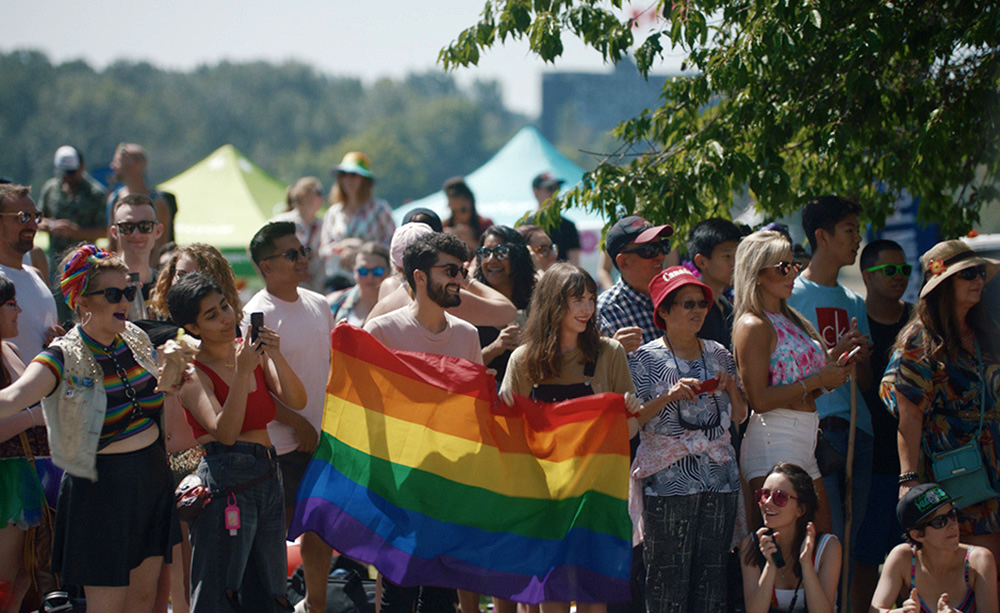On the surface, directors Sean Horlor and Steve J. Adams’s film Someone Like Me is a story about a group of well-meaning Canadian folk coming together to help Drake, a young gay man from Uganda, start a new life in Canada.
This varied collection of strangers is supported by Rainbow Refugee, a non-profit society that matches LGBTQ+ asylum claimants with Canadian sponsors.
But even the very best of intentions are sometimes not enough to make things work out. In addition to the ordinary challenges of language, culture, money and housing in another country, hola! Global pandemic.
The emotional chronicle of survival and what it means to sponsor an asylum seeker screens at this month’s DOXA Documentary Film Festival running May 6 to 16 — now in its 20th year.
Like most young men, 22-year-old Drake wants to have a good time, which means drinking, smoking and partying. This effectively divides the group, with some members asserting that they feel uncomfortable with how things are working out, and others insisting that it’s not their role to dictate anyone’s behaviour.

There is nothing quite like witnessing a group of nice Canadians argue, in good passive-aggressive fashion. But as members peel away, a core group of committed people emerge.
Kay and their partner Emily take the lead in offering Drake a place to stay in their Vancouver home and helping him navigate the challenges and intricacies that come with uprooting one’s entire life. They’re helped along by new academic David and his partner, as well as Marlon, a young Torontonian who is himself a relative newcomer to Vancouver.
The filmmakers take a gentle and observational approach during the first year of Drake’s immersion in Vancouver, helped along by their foundational commitment to capturing stories from the city’s queer community.
As a couple, Horlor and Adams have made more than 20 projects together, but Someone Like Me is their first narrative feature. After pitching the idea in 2015 to the National Film Board, the pair researched for a few years before beginning a 15-month shoot.
But right in the middle of filming: enter COVID-19. The difficulties of working on a production during this period of time could almost be a documentary unto itself.

In Someone Like Me, as in all the best non-fiction stories, the most fascinating stuff happens in the interludes — the in-between moments when people inadvertently reveal their more complicated feelings and reactions.
At its heart, the film is a clear-eyed and deeply compassionate portrait of the fundamental Canadian-ness of the people involved for good or for bad, but mostly for good. Often, it’s hard not to be overwhelmed by the kindness, generosity and patience demonstrated by Drake’s core group of supporters.
The Tyee spoke to Horlor and Adams on the eve of their film’s hometown screening at the DOXA festival. Our interview is edited for length and clarity.
The Tyee: Given everything you experienced in bringing this film to fruition, would you have done things differently if you had known in advance?
Steve Adams: We’re workaholics and the type of guys who will do 14 days in a row and be fried by the end of it, but will do it again after a few days off. I think the lesson we learned from this film is to always seize the moment and to push ourselves even harder on shoot days.
Because we shot continuously over 15 months, there were times where we said, “Oh, we’ll go back and get this later.” As this past year showed us, with the pandemic especially, you may not have that luxury, so make the most of the time you have.
Was there a point in making the film that you were tempted to give up?
Sean Horlor: There are two major turning points in the film, and we were blindsided by both of them. They really made us wonder if this was all a huge mistake. All these people are trusting us with their stories, and nothing was turning out the way we hoped.
At one point, we had serious discussions with the NFB about starting over from scratch, with an entirely new group. But I’m glad we didn’t. The subjects believed in what we were doing, and so did Rainbow Refugee. We all made a commitment to see this out to the end and I think it’s a better film because of it.
In light of the COVID-19 restrictions, did you have to resort to different means of telling the story?
SA: I know we’re a year into this now, but when the pandemic hit last March, no one knew what the hell was happening or how long this would last. The NFB shut down all production across the country. We had no access to a camera or a crew, but still had another eight months of filming ahead of us. Our solution was to get production to buy an iPhone 11 Pro so we could ferry it to subjects to self-film.
We tried to make it like a game, create a choose-your-own adventure package with ideas for filming and questions for self-filmed interviews. It ended up being some of the most intimate and special moments in the film, where you really see everyone on their own terms.
While making the film, at what point did Drake and his group become the focal point of the story? Did the conflict that broke out among some of the group members take you by surprise, or did you see it coming?
SA: At the beginning of this, we knew that some or all of the group members would be there for the whole film. Yet we didn’t know anything about the newcomer or their country of origin. They could be coming from Russia or Brazil or Indonesia, or somewhere in the Caribbean, the Middle East or Africa. When the group selected Drake, we weren’t able to ask him for consent because of our agreement with Rainbow Refugee.
He knew that we were filming with his sponsors, but we had to wait for him to approach us and ask to be part of the film after he arrived. So that was a huge risk we took with the NFB. We also knew from our research with other groups that there could be a culture clash when Drake arrived. But the level of the conflict took us by complete surprise. There are a lot of twists and turns in this film, and that was a huge one.
The observational style of your film lends itself to some great fly-on-the-wall exchanges. It’s as much a portrait of queer life and community in Canada as it is a story about newcomers. Was the idea to hold a mirror up to this place and its people always part of the story?
SH: Our goal with this film was to create a present-day portrait of the queer community. We were curious how all these people would change each other and what shared experiences would emerge across the LGBTQ+ spectrum, despite very different cultural and socioeconomic backgrounds.
We wanted this to be a layered exploration of community and identity and not just a one-dimensional exploration of a newcomer’s first year in Canada. The more time we spent with Kay, Em, Drake, David, Marlon and Michael, the more we began to see parallels between their experiences and universal themes that would speak to both queer people and a broader audience, too.

In spite of the challenges, do you think Canada is still a good place with respect to LGBTQ+ folk?
SH: There are still over 70 countries in the world where you can be imprisoned or murdered because of your sexuality or gender diversity. Steve and I are very privileged to be white gay men living in Canada at this exact moment in history, but that is different for queer members of the BIPOC community and for gender-diverse folks.
There were surveys done a few years ago here in North America and in the U.K. that found over 50 per cent of LGBTQ+ folks will not hold hands or show affection in public because they fear being harassed or attacked. Tolerance is not acceptance. Queer representation is really important. It changes hearts and changes minds. It’s a huge reason why we wanted to make this film.
'Someone Like Me' is available to stream through DOXA from anywhere in Canada, May 6 to 16. A Q&A with directors Sean Horlor and Steve J. Adams, and special guests, will be livestreamed on Thursday, May 13 at 7 p.m. PDT. Register here. This film will also have a special DOXA Drive-In screening at the PNE Amphitheatre on May 14 at 5:30 p.m. PDT. Learn more on the DOXA website. ![]()
Read more: Rights + Justice, Gender + Sexuality, Film
















Tyee Commenting Guidelines
Comments that violate guidelines risk being deleted, and violations may result in a temporary or permanent user ban. Maintain the spirit of good conversation to stay in the discussion.
*Please note The Tyee is not a forum for spreading misinformation about COVID-19, denying its existence or minimizing its risk to public health.
Do:
Do not: